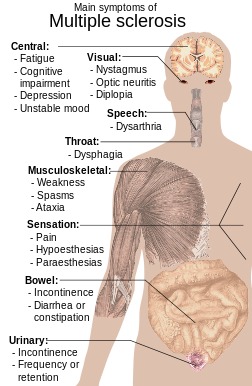- Home
- Benefits of Massage
- Massage For MS
As an Amazon Associate and affiliate with other programs, I may earn revenue from qualifying purchases through affiliate links. This does not affect the price you pay. Privacy Policy / Disclosures. This site is for educational purposes only.
Massage for MS Can Help Relieve Symptoms
The challenge with massage for MS is that no one approach is right for everyone living with multiple sclerosis. The massage therapist must assess your unique set of symptoms and choose techniques that might work for you.
Some people with MS get relief from deep tissue massage or neuromuscular therapy, while these massage techniques may create additional pain for other people. Some people can tolerate only gentle touch, such as myofascial release or light Swedish massage.
How Is Massage Good for MS?
Massage therapy can help reduce both the symptoms of MS and the effects of stress.
Massage increases blood circulation, improving the pliability of the tendons, ligaments, and other connective tissue, which may help relieve stiff joints. Easier movement makes stretching and exercise easier, which further helps improve the range of motion and flexibility of joints.
Improved blood circulation also helps maintain the integrity of muscle tissue, which may slow down the development of muscle weakness and atrophy.
Many massage techniques help reduce excess muscle tension or spasticity and relieve pain. Some massage techniques also soothe the nervous system, temporarily reducing excess stimulation of muscle fibers.
Is Massage for MS Always OK?
Ruth Werner, author of A Massage Therapist's Guide to Pathology, writes about massage for MS:
"First of all, let me offer some words of warning. In its acute, or "flare" stage, MS is an inflammatory condition. True, the inflammation is happening in the CNS where we don't have access, but the general rule for massage and acute inflammation is to let it pass.
"During an MS exacerbation, the body has a lot of activity to process. In my opinion (and absolutely anyone is invited to disagree), I think it's a better idea to let the dust settle before adding any more input in the form of massage."
Some types of energetic work may be OK during MS flares, as long as it doesn't overstimulate the client.
More from Ruth at Working with Multiple Sclerosis Patients.
Massage for MS Research
Search PubMed for articles about MS and massage therapy.
One study showed MS patients who received massage were less anxious and less depressed immediately after the massage sessions. By the end of the study, their self-esteem had improved, they had a better body image and image of disease progression, and they functioned better socially.
The other study used reflexology on the feet and massage on the calves of MS patients. Compared to the control group, patients receiving reflexology and massage improved significantly in paresthesias, urinary symptoms, and spasticity. At a three-month follow-up, paresthesias remained significantly improved. (Paresthesias is a tingling, burning, tickling, pricking, or numb sensation of the skin.)
Image Credit: Mikael Häggström [Public domain], via Wikimedia Commons





